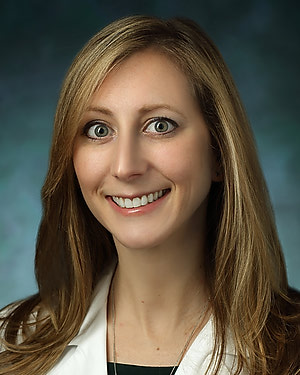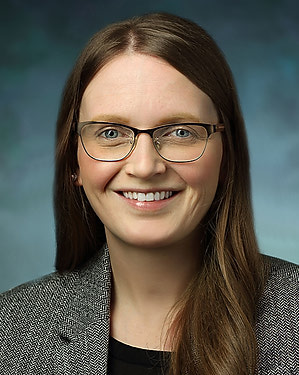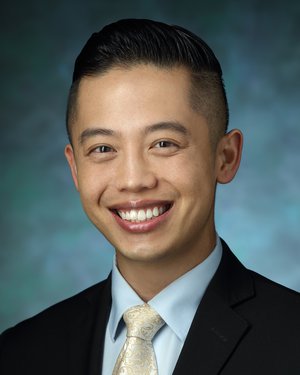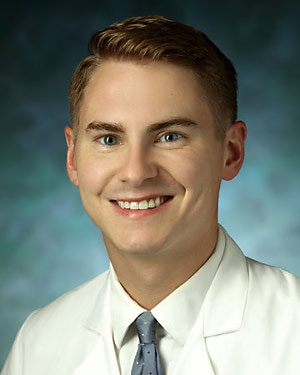-
Corinne Casey, OD

- Clinic Director, Wilmer Eye Institute - Odenton
- Assistant Professor of Ophthalmology
FAQs
-
Sites: three different clinic sites within Johns Hopkins
- East Baltimore (main campus downtown): roughly 1.5 days per week
- Bayview (satellite campus in Baltimore): one day per week
- Odenton (satellite outpatient clinic): two days per week
Clinics: all within the ‘Comprehensive Eye Care’ clinics
Attendings: each provider has a specialty niche on top of general and primary eye care (ie: comprehensive exams, soft contact lens fits, diabetic eye exams)
- Dr. St. Clair (East Baltimore/downtown): mix of neuro, retina cases, ocular trauma, triages, etc.
- Dr. Guo (Bayview): Sjogren’s / dry eye co-management as well as PROSE fits for patients with exposure keratopathy, graft vs host disease, etc.
- Dr. Casey (Odenton): glaucoma care (management of glaucoma and involvement in post-operative care of MIGS, trabeculectomies)
- Dr. Crum (Odenton): refractive evaluations, specialty contact lenses including corneal RGPs and scleral lenses for irregular astigmatism and ocular surface disease
See biographies of our attendings.
-
The typical day begins at 8:00 a.m., with the last patient between 3:30 and 4:00 p.m.. We expect that your clinical schedule will conclude by 5:00 PM; however, the completion of charts, journal clubs, and academic projects would require after-hour dedication.
The template and number of patients will vary throughout the year based on the resident’s demonstration of clinical aptitude, in concordance with the supervision policy.
-
We cannot provide a detailed outline of experiences, as this is our inaugural year. That said, we expect 10 patients per day (at least) x 4.5 days (half day of admin time) = 45 patients a week. Patient encounters will vary from year-to-year due to attendance or participation at education conferences.
Also, as the program develops, we expect to offer shadowing opportunities in sub-specialty ophthalmology clinics to gain experience with our retina, glaucoma, and corneal faculty. At this time, these rotations are not protected or guaranteed; therefore, it’s important to assume that this will be an OD-only education and clinical experience.
-
We would like to find a candidate who has an expansive baseline understanding in ocular pathology. We expect for you to encounter complex cases (given that this a tertiary referral center) that ultimately you will be expected to treat and/or triage.
We want a candidate to be motivated and eager to learn and contribute to the environment. An ideal candidate would be interested in pursuing a career as clinical faculty in an academic medical center. This environment is unique and would be translational to a similar practice design – academic institution, college of optometry, or large OD/MD referral center.
Additionally, we expect more than just clinical aptitude. We are looking for an individual has interest in contributing to local and national optometric communities through Grand Rounds presentations, conference abstracts and papers, or publishing manuscripts in peer-reviewed journals. We would need someone who is open to learning from all faculty, confident in their current clinical management skills, and motivated to perform academic endeavors outside of clinic hours.
-
The program will offer a comprehensive experience, including some routine optometric care, but will focus on more medically-oriented experiences. You will spend a year at a large tertiary medical center and will have exposure to urgent add-ons, eye screening for diabetes, glaucoma, and high-risk medications.
We would want a resident who does not wish to practice just in specialty contact lenses nor just in ocular pathology. Our program, although labeled as "primary eye care," offers robust, comprehensive medical eye care. As an academic medical center (and one of the top 3 eye hospitals nationwide), we provide the resident with advanced levels of clinical competency that would not be obtained from 4th-year extern rotations alone.
-
We do not offer housing to our residents. It would be required that you find an apartment or house to rent. We will provide resources about Baltimore neighborhoods and suburbs of Baltimore that would be ideal places to reside for your one-year program.
There are many Baltimore neighborhoods that are safe and walkable/accessible via public transit to both the downtown and Bayview hospital locations. As for the Odenton location (near Annapolis), the resident would most likely need to have access to a car.
-
By the conclusion of the first year.



